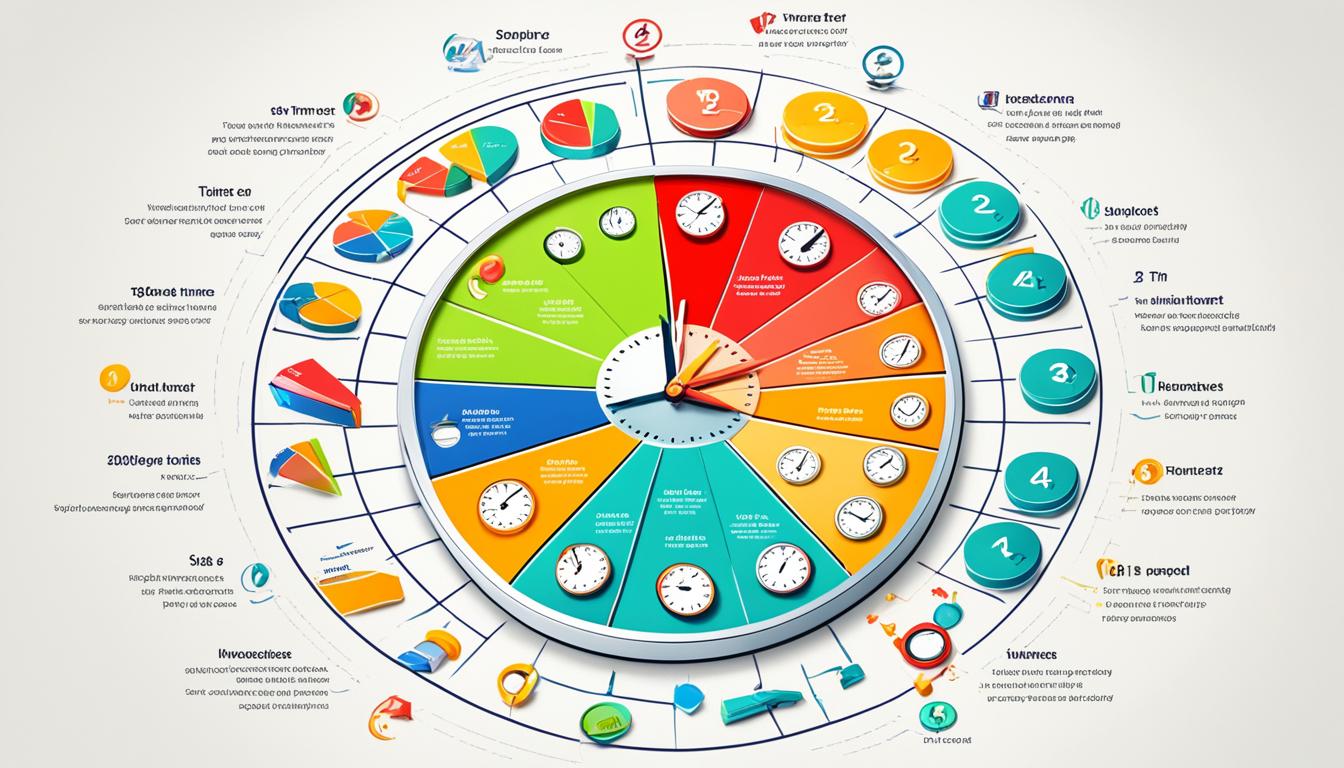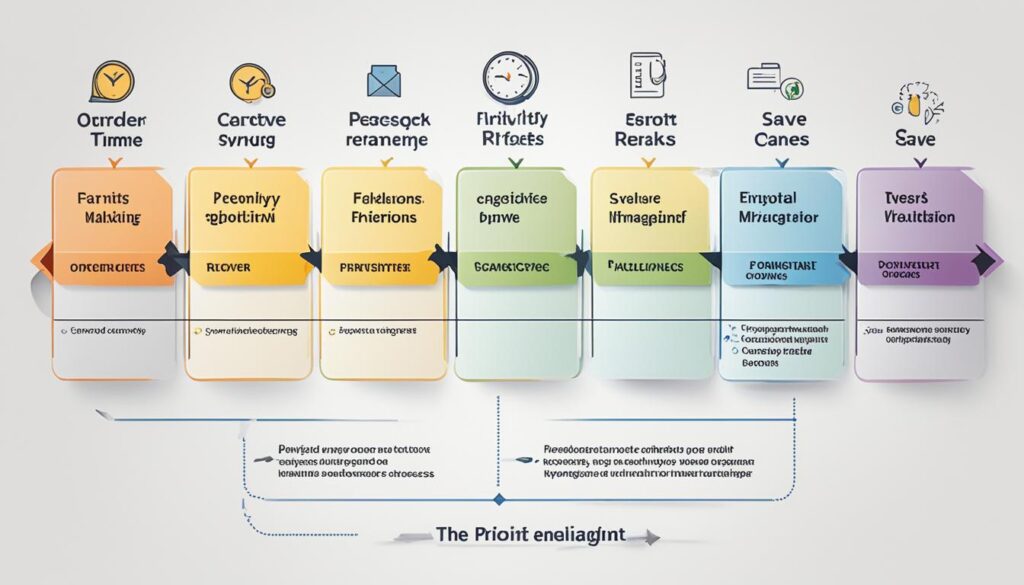Unlock Success with Time Management Statistics

Do you ever feel like there aren’t enough hours in the day to accomplish everything you need to? Are you constantly battling with deadlines and struggling to stay organized? If so, you’re not alone. Time management is a skill that can make or break your success, both personally and professionally.
But how do you know if your time management efforts are paying off? What are the statistics behind effective time management, and how can they help you boost your productivity? In this article, we’ll dive into the world of time management statistics, exploring the data, analyzing the metrics, and uncovering strategies to optimize your work organization.
Key Takeaways:
- Time management is crucial for success in any field.
- The average employee spends about 31 hours per month in unproductive meetings.
- 89% of respondents admit to wasting time at work every day.
- Effective time management enhances productivity and efficiency.
- Understanding time management statistics can help you prioritize tasks and make informed decisions.
The Consequences of Mismanaged Time
Mismanaged time in the workplace can have severe repercussions and lead to a variety of detrimental outcomes. This section explores the negative consequences that arise from a lack of effective time management and highlights the importance of addressing these issues.
Increased Stress
One significant consequence of mismanaged time is the heightened levels of stress experienced by employees. A staggering 44% of workers in the United States report experiencing “time anxiety” on a daily basis. This constant pressure to complete tasks within limited timeframes can be overwhelming and take a toll on both mental and physical well-being. The stress caused by mismanaged time can lead to decreased motivation, burnout, and a decline in overall productivity.
Inefficiency and Wasted Resources
Poorly managed time often results in inefficiency, where tasks take longer to complete due to disorganized workflows and procrastination. This inefficiency creates a ripple effect, causing delays in other projects and negatively impacting team members and project timelines. Additionally, mismanaged time leads to the squandering of valuable resources such as time, money, and effort. These wasted resources could have been better allocated to more important and productive endeavors.
Poor Quality of Work
When time is not effectively managed, the quality of work can suffer. A staggering 86% of workers believe that improved time management would enhance their focus on tasks. When individuals are rushing to meet deadlines or are unable to allocate sufficient time to complete a task diligently, the result is often subpar work. Inconsistent quality of work can erode client trust, harm professional reputations, and hinder career advancement.
Injured Reputations
Mismanaged time can lead to missed deadlines, unfinished projects, and a general perception of unreliability. These consequences can damage an individual’s reputation within an organization, affecting relationships with colleagues, clients, and superiors. When others lose confidence in an individual’s ability to manage their time effectively, it can hinder collaboration, obstruct career growth, and limit future opportunities. The credibility and trustworthiness of an individual or team can be severely injured as a result.
The Domino Effect
It is essential to recognize that these consequences of mismanaged time are interconnected and can create a domino effect within the workplace. For example, increased stress can lead to decreased productivity and motivation, which in turn can further hinder time management efforts. Similarly, poor quality of work and injured reputations can cause delays in projects and damage team dynamics. Ultimately, the negative impacts of mismanaged time can cascade, exacerbating the overall inefficiency and inefficacy of an organization.
| Consequences of Mismanaged Time | Percentage/Impact |
|---|---|
| Increased Stress | 44% of workers experience “time anxiety” daily |
| Inefficiency and Wasted Resources | Tasks take longer to complete, leading to wasted time, money, and effort |
| Poor Quality of Work | 86% of workers believe better time management would improve task focus |
| Injured Reputations | Mismanaged time can damage professional reputations and hinder career opportunities |
| The Domino Effect | Negative consequences can compound and create further inefficiency in the workplace |
The Benefits of Good Time Management
Good time management brings several benefits to individuals and organizations. When you effectively manage your time, you enhance productivity and efficiency. By allocating your time wisely and staying organized, you can complete tasks in an organized and focused manner. This allows you to work more effectively and achieve better results.
Meeting deadlines and producing high-quality work also earns you a positive reputation. Others will trust and respect you for your ability to deliver on time and consistently produce excellent work. Your reputation plays a crucial role in your professional success, opening up increased opportunities for growth and advancement.
Stress reduction is another significant benefit of good time management. When you manage your time well and prioritize tasks, you avoid feeling overwhelmed by your workload. By having a clear plan and structure, you can stay calm and focused, leading to reduced stress levels and improved well-being.
Additionally, good time management creates opportunities for success. When you effectively manage your time, you create space for career growth, skill development, and goal achievement. By making the most of your time, you can seize new opportunities, explore innovative ideas, and maximize your potential for success.
The Productivity Boost
One of the key benefits of good time management is an increase in productivity. When you prioritize tasks, eliminate distractions, and focus on important activities, you can work more efficiently and get more done in less time. By optimizing your productivity, you can accomplish more in your professional and personal life, leading to a greater sense of accomplishment and fulfillment.
The Power of a Strong Reputation
A positive reputation is invaluable in today’s competitive world. When you effectively manage your time and consistently meet deadlines, you build a reputation as a reliable and trustworthy individual. This not only boosts your professional image but also opens doors to new opportunities and collaborations. A strong reputation can attract clients, employers, and colleagues who recognize your dedication and commitment to excellence.
Reduced Stress, Enhanced Well-being
Stress is a common challenge in the modern workplace, but good time management can help alleviate some of its effects. When you have control over your time and tasks, you can better manage your workload and avoid feeling overwhelmed. This leads to reduced stress levels and improved overall well-being. By implementing effective time management strategies, you can achieve a healthier work-life balance and find more time for activities that bring you joy and fulfillment.
Unlocking Opportunities for Success
Effective time management creates opportunities for success. By managing your time well, you can prioritize your most important tasks and goals. This focus allows you to make meaningful progress towards your objectives and achieve success in various areas of your life. Whether it’s advancing in your career, developing new skills, or achieving personal goals, good time management paves the way for growth and accomplishment.
Investing in time management skills and strategies is an investment in your future. By harnessing the benefits of good time management, you can boost your productivity, enhance your reputation, reduce stress, and unlock increased opportunities for success.
Knowing How You’re Spending Your Time
Before you can effectively manage your time, it’s crucial to have a clear understanding of how you’re currently spending it. A time audit and data analysis can provide valuable insights into your time allocation. By logging your daily activities and analyzing the data, you can identify patterns and trends, such as the time spent on productive versus unproductive tasks and your peak productivity times.
This information empowers you to make informed decisions on how to allocate your time more effectively. For example, you may realize that you’re spending too much time in meetings, which could be reduced to free up valuable hours for deep, focused work. By identifying your most productive times, you can schedule important tasks during these periods for optimal results.
Regular check-ins and periodic time audits ensure that you stay on track and adapt your time management strategies as needed. By regularly assessing how you’re spending your time, you can identify areas for improvement and make necessary adjustments to optimize your productivity and efficiency.
Take control of your time by conducting regular time audits, analyzing the data, and making informed decisions to enhance your time management skills.

| Time Allocation | Hours |
|---|---|
| Productive Tasks | 45 |
| Unproductive Tasks | 15 |
| Meetings | 10 |
| Breaks and Distractions | 5 |
The Power of Prioritization
Prioritization is a critical aspect of effective time management. When you can discern between essential and trivial tasks, you can focus your energy on what will contribute most to your goals. Prioritizing tasks allows you to make the most efficient use of your time and resources, ensuring that you are working on what matters most.
One powerful technique for prioritization is task ranking. By assigning a priority level to each task, you can easily identify and tackle high-priority items first. This prevents important tasks from being overshadowed by less crucial ones and helps you stay on track with your objectives.
Another key element of prioritization is task allocation. Allocating specific time slots for high-priority tasks ensures that you are devoting your peak energy levels to the most critical work. By reserving blocks of time in your schedule for important tasks, you can maximize your productivity and ensure that these tasks are completed efficiently and effectively.
In order to develop and refine your prioritization skills, it’s important to invest in time management training. Especially for less experienced employees, time management training provides valuable insights and techniques for prioritizing tasks effectively. By proactively offering this training, employers can equip their workforce with the skills needed to succeed in a fast-paced, demanding work environment.
Benefits of Prioritization:
- Focus on what matters most
- Make efficient use of time and resources
- Avoid getting overwhelmed with trivial tasks
- Maximize productivity by allocating time to high-priority tasks
- Improve decision-making by identifying what needs immediate attention
Remember, prioritization is key to effective time management. By mastering the skill of prioritizing tasks and investing in time management training, you can unlock your full potential and achieve greater success in both your personal and professional life.

Time Management Techniques and Strategies
To further enhance your productivity and efficiency, there are various time management techniques and strategies you can utilize. These methods will help you make the most of your time and achieve your goals effectively. Let’s explore some of these techniques:
Pomodoro Technique
The Pomodoro Technique is a popular time management method that involves working in focused time blocks followed by short breaks. Here’s how it works:
- Choose a task you want to work on.
- Set a timer for 25 minutes, known as a “Pomodoro.”
- Work on the task with full focus until the timer goes off.
- Take a short 5-minute break.
- Repeat the process, taking a longer break (around 15-30 minutes) after completing a set of Pomodoros.
The Pomodoro Technique helps improve concentration and productivity by breaking tasks into manageable chunks and providing consistent breaks to maintain focus.
Delegation
Delegation is an essential tool for effectively managing your time, especially if you are in a leadership position or working on projects with a team. By assigning tasks to others who have the skills and capacity to handle them, you can free up your time for more high-priority responsibilities. Delegating not only reduces your workload but also empowers team members by giving them opportunities to grow and contribute.
Reflection and Adaptation
Regularly reflecting on your time management strategies is crucial for continuous improvement. Take the time to evaluate how your current methods are working for you and consider making adjustments as needed. Ask yourself questions like:
- Are there any time-wasting activities I can eliminate?
- What tasks or activities contribute most to my goals?
- How can I better allocate my time to ensure maximum productivity?
By reflecting on your experiences, you can identify areas for improvement and adapt your time management strategies accordingly.
Time Management Training
Investing in time management training is an effective way to learn and develop the necessary skills for optimizing your productivity. These training programs provide valuable insights and techniques to better manage your time, enhance your organizational skills, and boost your overall efficiency. By participating in time management training, you can gain practical knowledge and strategies that will empower you to take control of your time effectively.
Remember, applying these time management techniques and strategies, such as the Pomodoro Technique, delegation, reflection and adaptation, and time management training, can help you become more productive, efficient, and successful in managing your time.

| Technique | Description |
|---|---|
| Pomodoro Technique | A time management method involving focused work periods (Pomodoros) followed by short breaks. |
| Delegation | Assigning tasks to others to free up time and empower team members. |
| Reflection and Adaptation | Regularly evaluating and adjusting time management strategies for continuous improvement. |
| Time Management Training | Investing in professional training to learn effective time management skills and techniques. |
Conclusion
Effective time management is the key to unlocking success in today’s fast-paced work environment. When time is mismanaged, it can lead to increased stress, inefficiency, and poor quality of work, hindering your ability to achieve your goals. On the other hand, good time management brings numerous benefits such as increased productivity, a positive reputation, and reduced stress levels, enabling you to excel in your professional endeavors.
Understanding how you spend your time and prioritizing tasks are essential components of effective time management. By conducting a time audit and analyzing your daily activities, you can gain valuable insights into your time allocation habits. Armed with this knowledge, you can make informed decisions on how to allocate your time more effectively, focusing on high-priority tasks and optimizing your productivity.
Implementing time management techniques and strategies, supported by comprehensive time management training, is crucial in optimizing productivity and achieving a better work-life balance. Techniques such as the Pomodoro Technique, delegation, and regular reflection and adaptation can further enhance your time management skills. By mastering these strategies and investing in time management training, you can unlock your full potential, overcome challenges, and pave the way for personal and professional success.
FAQ
What are some time management statistics?
Time management statistics reveal that the average employee spends about 31 hours per month in unproductive meetings and that 89% of respondents admit to wasting time at work every day.
What are the consequences of mismanaged time?
Mismanaged time can lead to increased stress, inefficiency, poor quality of work, injured reputations, and a domino effect of negative impacts.
What are the benefits of good time management?
Good time management enhances productivity, reputation, reduces stress levels, and creates opportunities for success in career growth, skill development, and goal achievement.
How can I know how I’m spending my time?
Conducting a time audit and analyzing daily activities can provide insights into how time is allocated, allowing for informed decisions and regular check-ins for adjustments.
How important is prioritization in time management?
Prioritization is crucial in time management as it enables individuals to focus on essential tasks, allocate specific time slots, and can be developed through time management training.
What time management techniques and strategies can I use?
Time management techniques include the Pomodoro Technique, delegation, reflection and adaptation, all of which can be learned through time management training.
How can time management training benefit me?
Time management training equips individuals with necessary skills to effectively manage their time, optimize productivity, and contribute to a better work-life balance.






